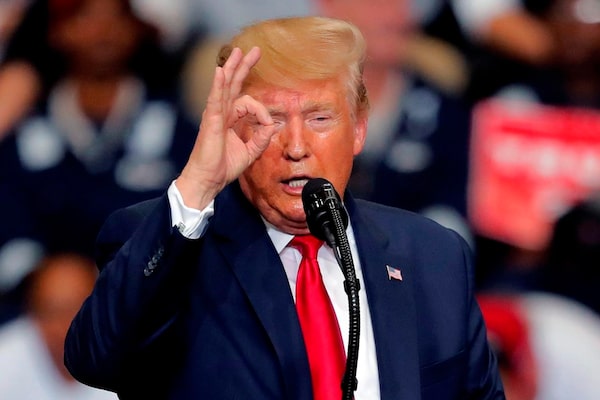
The warring sides within Mr. Trump have a long history.The Associated Press
Waller R. Newell is a professor of political science and philosophy at Carleton University and the author of Tyrants: Power, Injustice and Terror.
For three years as U.S. President, Donald Trump has been at war with himself – between being the isolationist he campaigned as and the interventionist he was dragged into becoming. With his decision to pull U.S. forces out of Syria and green-light a Turkish invasion to crush the Kurds, America’s allies in the fight against the Islamic State, the isolationist has won.
The warring sides within Mr. Trump have a long history. Isolationism goes back to George Washington’s warning that the U.S. should “resist the intrigues” of foreign entanglements. Interventionism emerged when Woodrow Wilson led America into the First World War to “make the world safe for democracy.” Franklin Roosevelt led the U.S. to war against the Japanese and Nazi empires. John F. Kennedy pledged that Americans would “pay any price” to defend freedom, culminating in the Vietnam War. Richard Nixon employed massive military power to force the Communist North to the peace table.
Other presidents were determined to end America’s role as “the world’s policeman.” Yet even they were drawn unavoidably into wielding the presidency’s awesome power to shape foreign affairs. Jimmy Carter favoured U.S. withdrawal from international conflicts, yet ended up brokering the Camp David Accords between Israel and Egypt. Bill Clinton wanted to focus on America’s economic resurgence but ended up fighting an air war to save Bosnian Muslims and Croats from genocide. George W. Bush was perceived as an isolationist who wanted to reduce U.S. participation in NATO. But 9/11 forced him to spend his two terms as a war president.
Why do so many would-be isolationist presidents become interventionist hawks? Two reasons. First, America’s international economic entanglements and staggering military might inevitably lead allies or supplicants to pressure the U.S. to intervene in conflicts and check the ambitions of rising powers to menace the U.S. or its allies. Second, presidents frustrated by years-long wrangling with Congress to enact their domestic agendas often turn with relief to their ability as Commander-in-Chief to translate their wishes into immediate action.
Mr. Trump assumed the presidency bent on bringing U.S. forces home from protracted conflicts such as Afghanistan, reflecting the Republican Party’s shift away from neo-conservative interventionism. Yet from the outset, he found himself pressured into an interventionist role. In every case, the isolationist side of Mr. Trump fought against the interventionist role thrust upon him, manifest in a series of public tugs-of-war with his foreign policy advisers. He fulfilled his promise to “annihilate” IS, but was determined to withdraw U.S. forces from Syria speedily – prematurely, his critics argued. He pressured North Korean leader Kim Jong-un to suspend his nuclear weapons program. But whereas National Security Adviser John Bolton insisted on disarmament by the North alone, Mr. Trump embraced the position that the entire Korean Peninsula was to denuclearize, seeming to imply the removal of the U.S. nuclear umbrella over South Korea, saving huge amounts of money that could be better spent at home.
Although the Kurdish militia was principally responsible for defeating IS with U.S. backing, from early on Mr. Trump agitated for withdrawing U.S. assistance, telling Turkish President Recep Tayyip Erdogan that this “non-sense” of supporting the Kurds “should have ended a long time ago.” When Mr. Trump announced the assistance was winding down, the Pentagon publicly contradicted him, insisting that military aid to the Kurds was actually being increased. Mr. Trump finally prevailed when he acquiesced to Mr. Erdogan’s invasion of northeastern Syria to create a Turkish border zone jointly patrolled with Russian troops, accompanied by an ominous pronouncement from Mr. Erdogan and Russian President Vladimir Putin that no “separatist” entity would be tolerated anywhere in Syria, appearing to dash the Kurds’ hopes of maintaining a de facto autonomy. In the three-year war between Mr. Trump the isolationist and Mr. Trump the involuntary interventionist, the isolationist finally won, sealed by the departures of Mr. Bolton and defence secretary Jim Mattis.
Mr. Trump does not seem to have reflected that sometimes withdrawing U.S. power constitutes an even greater interference in other people’s affairs than maintaining it – in the case of the Kurds, undermining a loyal ally and strengthening three major foes: Russia, Turkey and Iran.
Abandoning the Kurds shook the Republican foreign policy establishment. Few people now living can remember a non-hawkish Republican White House. Yet isolationism was once a hallmark of Republicanism, including Senator Robert Taft and presidents Herbert Hoover and Dwight Eisenhower, the latter a reluctant internationalist who refused to intervene in the Hungarian Revolution or assist allies Britain and France in the Suez Crisis, strengthening Egyptian dictator Gamal Abdel Nasser and Soviet influence in the Middle East. We may be returning to that norm.
Keep your Opinions sharp and informed. Get the Opinion newsletter. Sign up today.